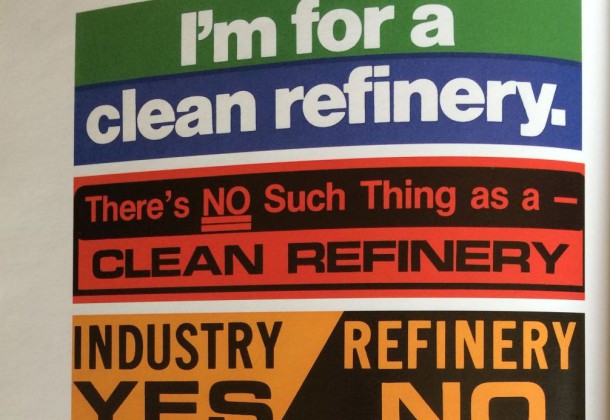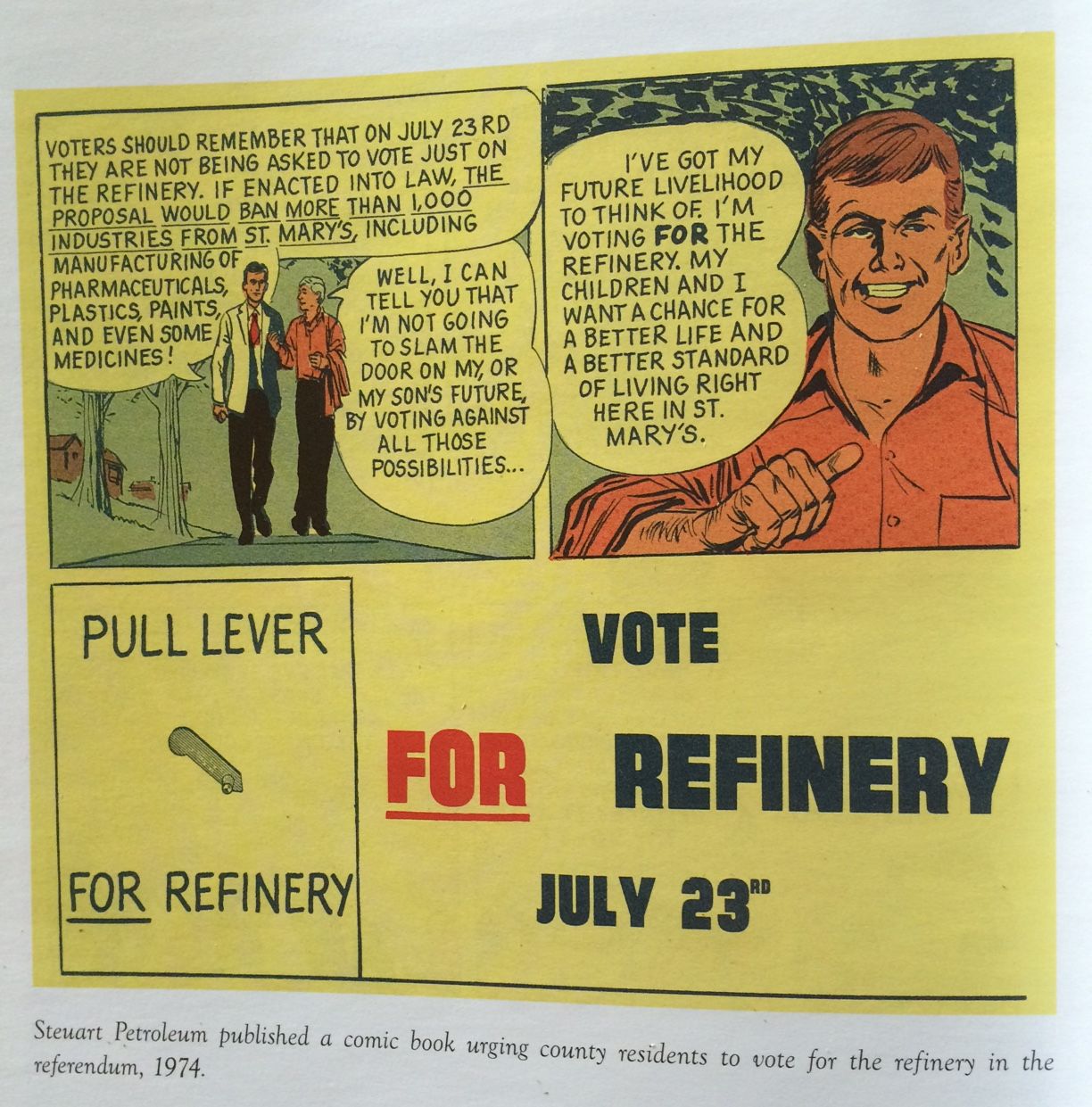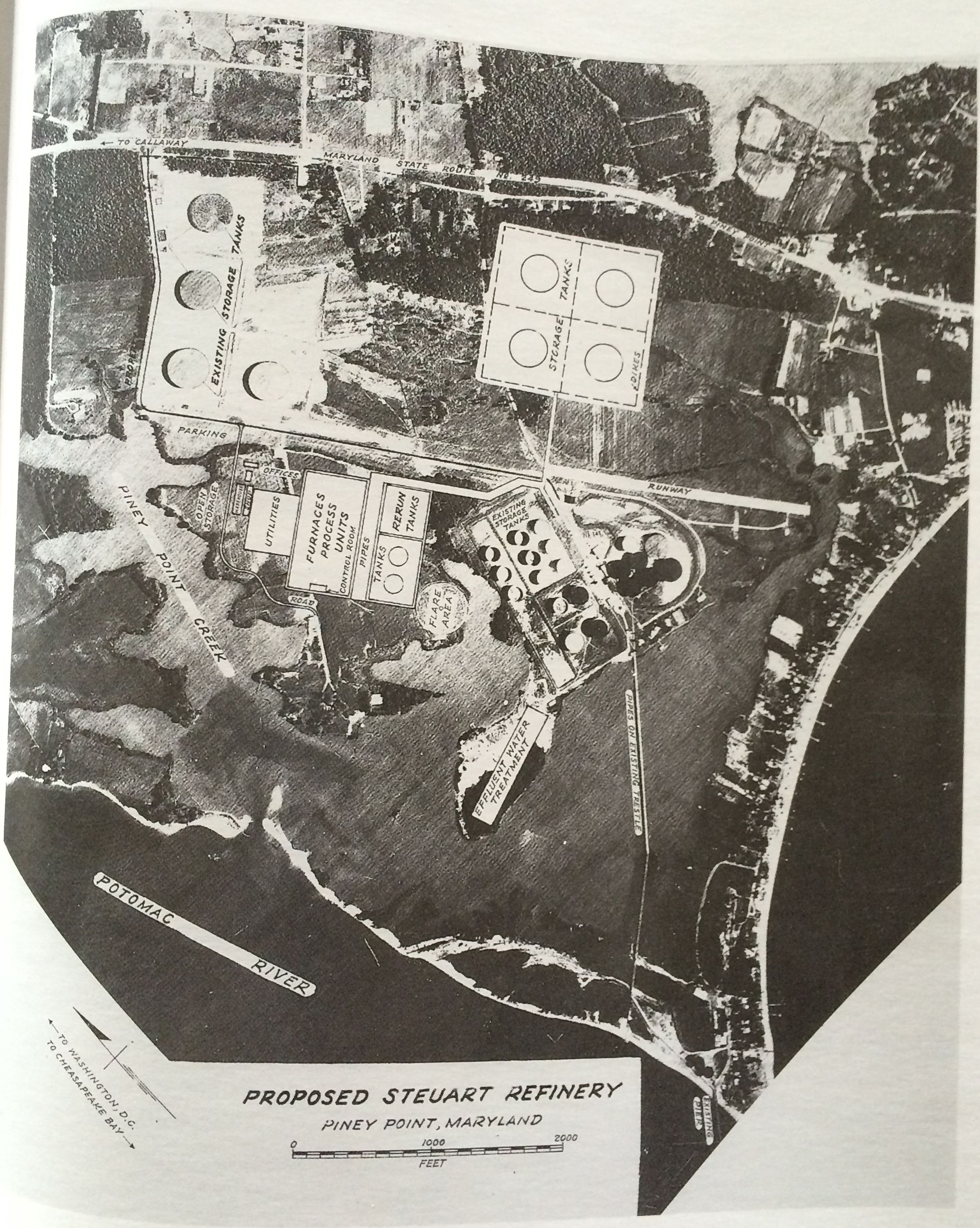In It To Win It

The SlackWater Center at St. Mary’s College is a consortium of students, faculty, and community members documenting and interpreting the region’s changing landscapes. Oral histories are at the core of the center, which encourages students to explore the region through historical documents, images, literature, and scientific and environmental evidence. Some of this work is published in the print journal SlackWater, some of which is online and some published here.
Bayonne On The Potomac, Part II: In It To Win It
Told by Catherine “Kitty” Barnes
Soon after Steuart Petroleum announced their new plan to build an oil refinery at Piney Point, the late Senator Paul J. Bailey introduced legislation to ban refineries in St. Mary’s County. Senator Bailey was also behind the effort to hold a countywide referendum, scheduled for July 23, 1974, in which St. Mary’s County citizens would vote for or against the refinery. Another study committee, this one led by Ford L. Dean, was formed to evaluate the potential impact of the proposed refinery, while major campaigns were launched to persuade voters to choose one position or the other.
It is hard to overstate the importance of the refinery issue to the county’s residents. Steuart spent thousands of dollars arguing its case to the voters. The Chesapeake Biological Laboratory produced a scientific report emphasizing the “exceptionally high and severe environmental risks” posed by a refinery. The study committee visited refineries in other states. 1974 was a election year, and candidates for state and local office jockeyed to declare their opposition to the refinery. The Enterprise carried dozens of articles, editorials, and letters to the editor in the months preceding the vote.
In this 2007 interview with Jessica Everett, Catherine “Kitty” Barnes recalls the role of citizens in opposing the refinery at Piney Point. Mrs. Barnes talks about Jack Witten, his Citizens Coalition for St. Mary’s County, and the questions raised about the refinery’s impact on the county’s groundwater supply.
By 1974, the Potomac River Association had completed three environmental fights in the space of about six years and we were worn out. Jack Witten, when he came on the scene, became our knight in shining armor. He really was.
Witten formed a new group called the Citizens Coalition [for St. Mary’s County] and its purpose was to win the referendum that Senator Paul Bailey had gotten through the legislature — ensuring that the whole county could vote on whether we wanted to have an oil refinery. This was Steuart’s third attempt, after all, and so the total county had to be included in this decision. The county had been included in the other fights to a great extent, but not to the fullest extent that had to be done this time, as it was now going to go up for a vote by the citizens.
 Jack Witten had transferred to the county from NavAir in D.C., and was a highly capable, totally dedicated man. He loved the waters of the Chesapeake Bay. He had his sailboat and he and his wife Millicent did a lot of racing. And Jack was just incensed at the thought of all of this beautiful virgin area being desecrated with an oil refinery and petrol chemical plant. It was going to be a large operation, so he rose to the front, as I said, organized the Citizens Coalition, and led a magnificent fight.
Jack Witten had transferred to the county from NavAir in D.C., and was a highly capable, totally dedicated man. He loved the waters of the Chesapeake Bay. He had his sailboat and he and his wife Millicent did a lot of racing. And Jack was just incensed at the thought of all of this beautiful virgin area being desecrated with an oil refinery and petrol chemical plant. It was going to be a large operation, so he rose to the front, as I said, organized the Citizens Coalition, and led a magnificent fight.
Those of us in the Potomac River Association had garnered a lot of experience with three prior successes — including the two against Steuart — and had a lot of helpful wisdom gained from actual experience. The PRA immediately joined forced with the Coalition and worked as a second team under Jack Witten to make sure the county understood our way of thinking when they voted in the referendum.
The main factor that really convinced the upper county people that this was not good for the county was the groundwater issue. We learned all about groundwater from Fred McCoy, who was an expert, and this refinery was going to use so much of it. It really was a very critical factor. Naturally, in a fight like this you always have to gather all these kinds of facts. You have to know where you are coming from. You don’t dare give out false information because then you’re challenged, and, well, then you weaken your position. You have to have your facts correct so that you can back up any challenge with figures and so forth. That’s one of my secrets of winning.
Anyway, it was always my opinion that the groundwater issue was the key issue because people throughout the whole county realized that their wells might go dry. Or, that they’d have to drill either a new well or deeper artesian wells because the aquifers were going to be drained by the industrial complex. That was when they fully realized just how much [the refinery] was going to hurt them. They may not have been hurt by the air pollution or the water pollution, but they would definitely have been hurt by the massive use of groundwater. After this, there were a lot of other people who joined the coalition throughout the county who were not PRA board members. Jack had gathered together a marvelous representation of people throughout the whole county.
 I like to say that we won the referendum because of Jack Witten’s able leadership. [July 23] was a very tense day, the day the votes were counted, but what a celebration after it was over! If I remember correctly, we won 2 to 1. I’ve always been very grateful to Jack Witten and everybody else in the county. It was truly a countywide effort that stopped Steuart, so then he gave up on his refinery efforts and just expanded his tank farm. But, no more refinery efforts.
I like to say that we won the referendum because of Jack Witten’s able leadership. [July 23] was a very tense day, the day the votes were counted, but what a celebration after it was over! If I remember correctly, we won 2 to 1. I’ve always been very grateful to Jack Witten and everybody else in the county. It was truly a countywide effort that stopped Steuart, so then he gave up on his refinery efforts and just expanded his tank farm. But, no more refinery efforts.
Now, Steuart has changed hands several times. Valero is the most recent owner and they had applied for renewal of an air quality permit. So, the state Department [of the Environment] came down and had a public hearing on the renewal. The representative from Valero, which is based in Texas, I believe, gets up and says that they have more refineries than any other company in the U.S., raising the issue again of refineries.
So when I got up to speak again at the end, I just said to the Valero people, “I’m going to tell you right upfront. We citizens know how to stop refineries. We stopped refinery efforts by Steuart three times and we’re going to take you head on if you think you’re going to have a refinery.
“And I’ll tell you also upfront, you’re not going to win!”
Read the first installment, Bayonne on the Potomac, Part I: St. Mary’s County vs. Steuart Petroleum here.
Learn more about The Slackwater Center at their Leader member page
























